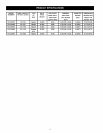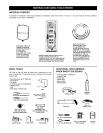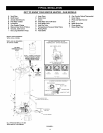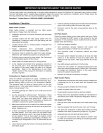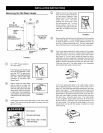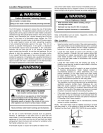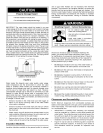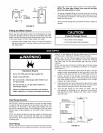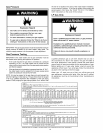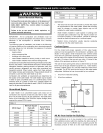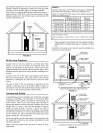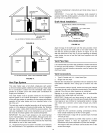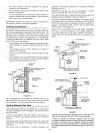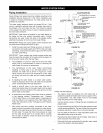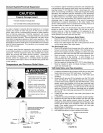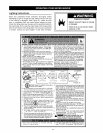
Gas Pressure
Explosion Hazard
• Gas leaks can not always be detected by smell.
• Gas suppliers recommend that you use a gas
detector approved by UL or CSA.
• For more information, contact your gas supplier.
• If a gas leak is detected, follow the "What to do if you
smell gas" instructions on the cover of this manual.
IMPORTANT: The gas supply pressure must not exceed the maximum
supply pressure as stated on the water heater's rating plate. The
minimum supply pressure is for the purpose of input adjustment.
Gas Pressure Testing
IMPORTANT: This water heater and its gas connection must be
leak tested before placing the appliance in operation.
• If the code requires the gas lines to be tested at a pressure
exceeding 14" W.C., the water heater and its manual shut-off
valve must be disconnected from the gas supply piping system
and the line capped.
• If the gas lines are to be tested at a pressure tess than 14" W.C.,
the water heater must be isolated from the gas supply piping
system by closing its manual shut-off valve.
NOTE: Air may be present in the gas lines and could prevent the
pilot from lighting on initial start-up. The gas lines should be purged
of air by a qualified technician after installation of the gas piping
system. While purging the gas piping system of air, ensure that
the fuel is not spilled in the area of the water heater installation,
or any source of ignition. If the fuel is spilled while purging the
piping system of air follow the "WHAT TO DO IF YOU SMELL
GAS" instructions on the cover of this manual.
LP Gas Only
Explosion Hazard
Have a qualified person make sure L.P. gas pressure
does not exceed 13" water column.
Examples of a qualified person include: licensed
plumbers, authorized gas company personnel, and
authorized service personnel.
Failure to do so can result in death, explosion, or
fire.
Liquefied petroleum gas is over 50% heavier than air and in
the occurrence of a leak in the system, the gas will settle at
floor level. Basements, crawl spaces, closets and areas below
ground level will serve as pockets for the accumulation of gas.
Before lighting an L.R gas water heater, smell all around the
appliance at floor level. If you smell gas, follow the instructions
as given in the warning on the front page.
When your L.R tank runs out of fuel, turn off the gas at ait
gas appliances including pilot lights. After the tank is refilled,
all appliances must be re-lit according to their manufacturer's
instructions.
Table1
NaturalGas PipeCapacityTable(Cu.Ft./Hr.)
Capacity of gas pipe of different diameters and lengths in cu. ft. per hr. with pressure drop of 0.3 in. and specific gravity
of 0.60 (natural gas).
Nominal mron Pipe Length of Pipe, Feet
1/2 132 92 73 63 56 50 46 43 40 38 34 31 28 26
3/4 278 190 152 130 115 105 96 90 84 79 72 64 59 55
I 520 350 285 245 215 195 180 170 160 150 130 120 110 100
1-1/4 1050 730 590 500 440 400 370 350 320 305 275 250 225 210
1-112 1600 1100 890 760 670 610 560 530 490 460 410 380 350 320
After the length of pipe has been determined, select the pipe size which wiB provide the minimum cubic feet per hour
required for the gas input rating of the water heater. By formula:
Gas Input of Water Heater
Cu. Ft. Per Hr. Required=
Heating Value of Gas (BTU/FT 3)
The gas input of the water heater is marked on the water heater data plate. The heating value of the gas (BTU/FT _)
may be determined by consulting the local natural gas utility.
Table2
LP Gas CapacityTable
Maximum capacity of pipe in thousands of BTU per hour of undiluted liquefied petroleum gases (at 11 inches water
column pressure). Based on a pressure drop of 0.5 inch water column.
Nomina[ Iron Pipe Length of Pipe, Feet
Size, in. 1(1 20 30 40 5£) 60 7Q 80 9_) ] O0 125 _50
1/2 275 189 152 129 114 103 96 89 83 78 69 63
3/4 576 393 315 267 237 217 196 185 173 162 146 132
1 1071 732 590 504 448 409 378 346 322 307 275 252
1=114 2205 1496 1212 1039 913 834 771 724 677 630 567 511
Example: Input BTU requirement of the water heater 100,000 BTUH.
Total pipe length, 80 feet = 3/4" IPS required.
Additional tables are available in the latest edition of the "National Fuel Gas Code", ANSI Z223,1,
16



